2013.04.02 CoStone Capital Views:
CoStone Annual Meeting 2013 took placeatthe Interlaken OCT Hotel,Shenzhen, Guangdong on March 30 and 31,2013.
April 1, 2013
With the theme of "Transformation", the meeting offered a platform for CoStone Capital's investors to discuss hot topics with experts in economics, sociology and management. Nearly 300 investors, representatives of CoStone network companies and elites from various circles attended the meeting.
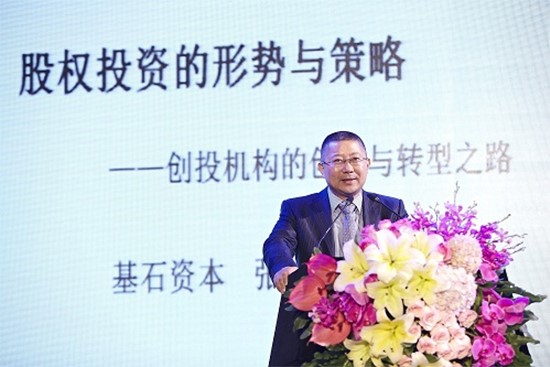
Zhang Wei on the Situation and Strategies of Equity Investment
At the meeting, Chairman Zhang Wei delivered a keynote speech on the situation and strategies of equity investment. He said, "CoStone Capital is optimistic about the long-term economic development of China. A dramatic plunge will not occur. The government has provided strong support for the social and economic development in China. Moreover, active private sectors also boast numerous investment opportunities." "The VC investment sector experienced great challenges in 2012. As the asset management industry is booming, VC investors need to develop more businesses and diversify their business modes and investment methods, so as to improve the service value chain and their risk resistance capacity and profitability," suggested Zhang Wei.
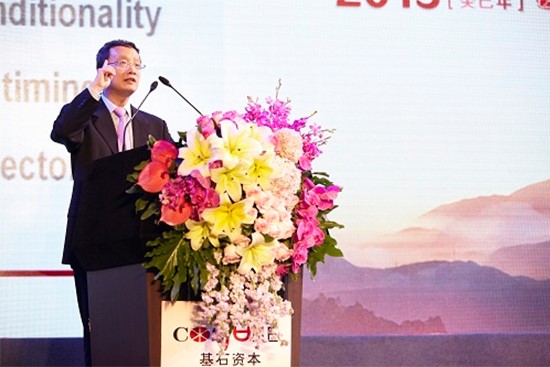
Dr. Tao Dong making a speech
The international and domestic macro-economic situation is one of the topics most concerned by people. Dr. Tao Dong, Managing Director and Vice Chairman of Credit Suisse Private Banking Asia Pacific, offered his insights into China's systematic reform, real estate market and industrial structure. As he pointed out, to increase productivity, China needs a structural and systematic reform, including allowing private capital to enter the service sector, and breaking up monopolies in the banking sector, eliminating the Hukou system, and activating the 500 million rural consumers.
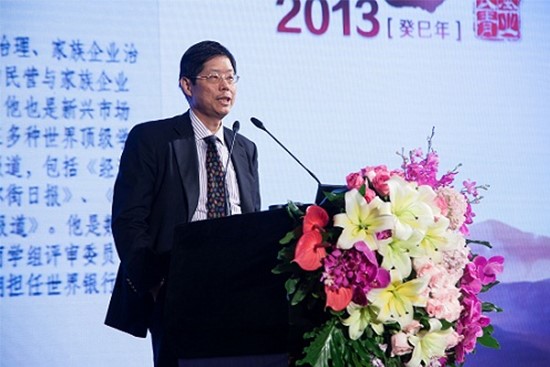
Prof. Joseph Fan making a speech
Professor Joseph Fan at the Chinese University of Hong Kong (CUHK) is an expert in the governance and inheritance of family businesses run by Chinese. He talked about the how to maintain the sustainable development of a family business. Based on the experience of Chinese family businesses in Southeast Asia and the West, Prof. Fan proposed new management modes other than the traditional one in which heirs to the family businesses have the ownership of special assets and professional managers are hired to manage them. He also explored the internal governance structure of family businesses from a unique perspective.
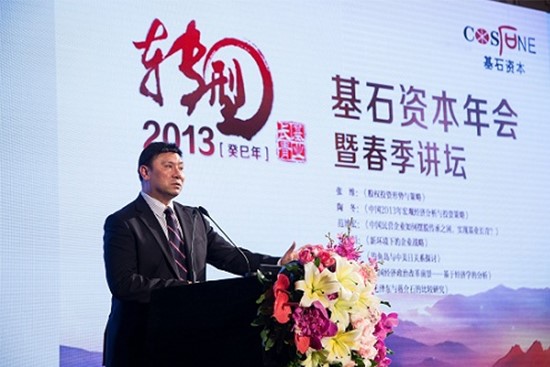
Prof. Terence Tsai making a speech
Prof. Terence Tsai at China Europe International Business School (CEIBS) proposed the strategies companies should adopt in the new context and offered suggestions for them on how to identify the key external influential factors. The issue of Chinese companies’ internationalization was also discussed in his speech.
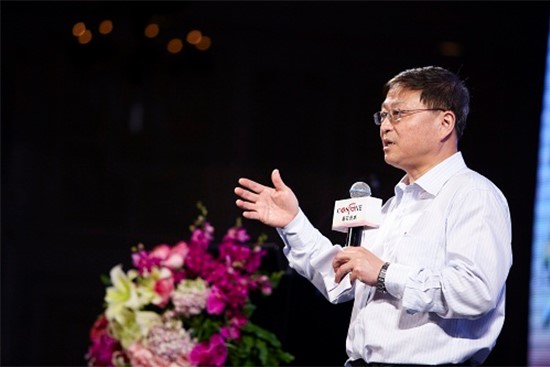
Prof. Yan Xuetong making a speech
The Sino-Japanese relations and the Diaoyu Islands dispute, which are of the public's concerns, have caused heated debates over the past two years. Professor Yan Xuetong, China's most renowned expert in international relations, shared his wisdom on the two issues.
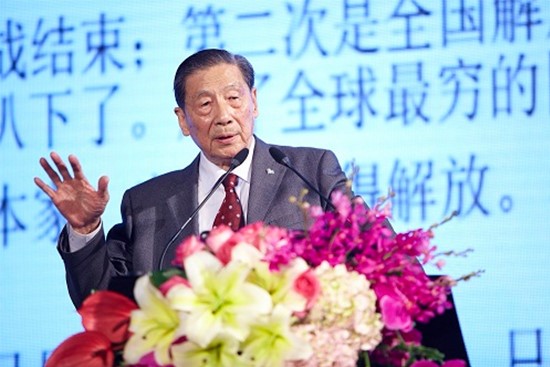
Mao Yushi making a speech
Mao Yushi, the winner of Milton Friedman Prize for Advancing Liberty, shared his research outcomes on China's economic prospects and government reforms at the meeting. As he pointed out, the past 30 years have been the prime period in modern China, but there remain a lot to be reformed. China needs to go on advancing social equity. Many attendees were inspired by his academic ideas.
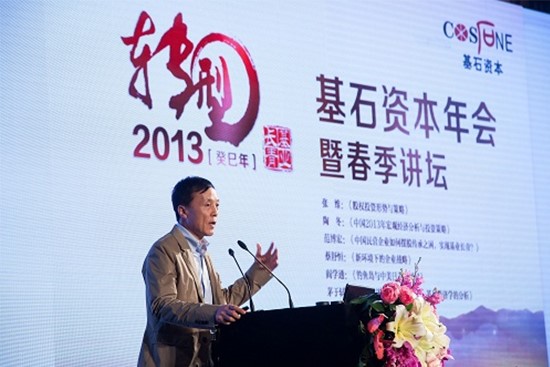
Prof. Yang Kuisong making a speech
Professor Yang Kuisong is a famous Chinese historian, with in-depth research on the history of the Communist Party of China, Sino-foreign relations and modern China. His comparative study of Chiang Kai-shek and Mao Zedong is quite refreshing. The two great men, traditionally viewed as enemies, are found with common features in many aspects in Prof. Yang's study.
Speaker
Dr. Tao Dong
Dr. Dong Tao, highly regarded by investors worldwide, is Managing Director and Vice Chairman of Credit Suisse Private Banking Asia Pacific. He has published more than ten books in his careers. Dr. Tao joined Credit Suisse in 1998 as Chief Regional Economist for Non-Japan Asia, with a focus on China. He moved from investment bank to private bank in July 2016. Prior to joining Credit Suisse, he was with Schroders Securities Asia as Senior Regional Economist and Head of China research. Dr. Tao holds a PhD degree and a master's degree from the University of Utah and a bachelor's degree from Beijing Foreign Language University. He worked in China, the US and Japan. He has been based in Hong Kong since 1994.
Prof. Joseph Fan
Joseph Fan is Professor of School of Accountancy and Department of Finance of CUHK. He holds a PhD in Finance from University of Pittsburgh, US, and a bachelor's degree in Economics from National Taiwan University. Before joining CUHK in 2004, he was on faculty of the Hong Kong University of Science and Technology and the University of Hong Kong.
Prof. Terence Tsai
Terence Tsai is Associate Professor of Management at CEIBS and PhD Supervisor at Shanghai Jiaotong University in China. He has also served as Visiting Professor of Management at National Taiwan University, Chang Gung University and Sun Yat-Sen University in Taiwan. Prior to joining CEIBS, he served as Acting Associate Dean (Graduate Studies), Director of Centre for Case Teaching and Research and Acting Director & Associate Director of MBA Programmes at CUHK. Dr. Tsai was also a full-time faculty member of Richard Ivey School of Business at the University of Western Ontario in Canada and Judge Business School at the University of Cambridge in England.
Prof. Yan Xuetong
Yan Xuetong is President of the Carnegie–Tsinghua Management Board and Dean of Tsinghua University's Institute of Modern International Relations. Prof. Yan is Editor-in-chief of the Chinese Journal of International Politics and serves as an adviser to several leading academic journals. He is Vice Chairman of both the China Association of International Relations Studies and the China Association of American Studies, and is a member of the Consultation Committee of China's Ministry of Commerce. He also serves on several boards, including those of the China Diplomacy Association and the China Association of Foreign Friendship. Prof. Yan has written several books, including Analysis of China's National Interests, winner of the 1998 China Book Prize, Ancient Chinese Thought, and Modern Chinese Power.
Prof. Mao Yushi
Prof. Mao Yushi is a Chinese economist. He graduated from Shanghai Jiao Tong University in 1950. He was a visiting scholar at Harvard University in 1986 and a senior lecturer at Queensland University in 1990.
Prof. Yang Kuisong
Prof. Yang Kuisong is a Chinese historian. His studies the history of the Chinese Communist Party. He is Professor of History at the East China Normal University, a researcher at the Si-Mian Institute for Advanced Study in Humanities. He also holds a position as a professor at Peking University. His research focuses on the history of modern China, the history of the Chinese Communist Party, Sino-Soviet relations, the relationship between the Kuomintang and the CPC, and the intellectual history of socialism.
Rewritten by: Jiang Xiaomei, Edited by: Du Zhixin, Li Yunzhen
The year 2019 marks the fortieth anniversary of China’s Reform &Opening-Up, once again, we meet at the turning point of history. What’s the next step for the game, is there any clear guidance? The answer is affirmative.
Our country is enjoying a good momentum of development, which does not come from the Washington Consensus nor the Beijing Consensus. China’s experience has proved that both the visible hand and the invisible hand are crucial: the visible hand, stands for the government-led reform, and would yield benefits for reform and opening up; the invisible hand, stands for the Marginal Power represented by the private sector, and would improve economic efficiency and tax collection, create jobs and employment opportunities.
Provided that we want to protect and expand the benefits form reform, three simple but mandatory agreements are to be made and followed: No.1 Private ownership must be recognized, protected and treated equally with public ownership constitutionally, both ownerships are scared and inviolable;No.2 Make further clarification of the principal position of market economy, “deepen economic system reform by centering on the decisive role of the market in allocating resources”, as President Xi addressed in the third Plenary Session of the 18th CPC Central Committee;No.3 Implement the guiding principles of “comprehensively promoting law-based governance” of the fourth plenum. The rule of law is essential for economic growth, irreplaceable to protect private ownership, and necessary to encourage innovation and entrepreneurship.
Above are three rules for us to avoid falling into the Middle-income Trap. Assuming that we are breaking systematic barriers to private enterprises’ participation in market economy, and boosting innovation and entrepreneurship of our society, then we are heading towards a promoting direction. We are marching in the path of light, regardless of the ups and downs of Sino-US relationship, the drop in GDP growth rate, or the monetary policy.
These principals also apply on knowing how better to run a business: don’t be hedged by rules and regulations at the beginning, pay more attention to your survival, and you’ll learn more when you start your second business.
For many years, Huawei has been the only Chinese company on the list of the Top 50 R&D Spenders. Regardless of the economy and its income, what Huawei has been doing is investing in its future, dedicated to R&D, continuously and resolutely. This provisional work underscores Huawei’s accomplishments, making Huawei anindustry leader.
So, there are standard answers on how to run a company,which could be summarized as concentration and professional dedication, continuous investment on innovation and trying harder in R&D. Entrepreneurship is also important, every single company needs entrepreneurs to push aside all obstacles and difficulties, to implement strategies and ideas. We, as investors, are destined to look for such outstanding entrepreneurs and their companies, invest in them and partner with them.
At this key point of history, a country, a company, or asingle individual, will all need to find the right path. Four decades after the Reform and Opening-up, it’s time to learn from our experience and stop “wadding across
